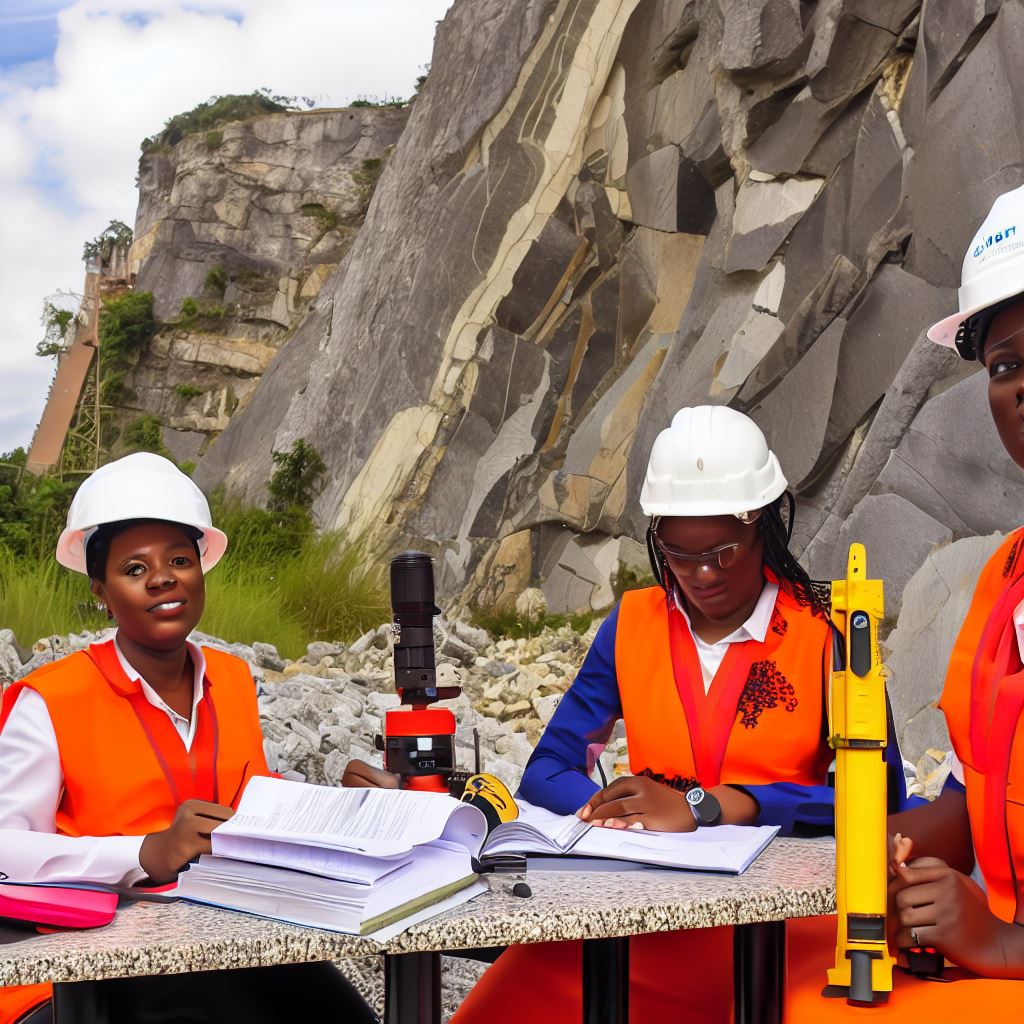Introduction
Geology is an important field of study that focuses on the Earth’s structure and composition.
Discussing women in geology in Nigeria is important to address gender disparities in the profession.
This blog section aims to explore the challenges faced by women in geology in Nigeria and the need for gender equality in the field.
Geology is a fascinating field that deals with the study of the Earth’s structure, processes, and materials.
It plays a crucial role in understanding natural resources, geological hazards, and the environment.
Despite its significance, there is a lack of representation of women in geology, particularly in Nigeria.
This section aims to shed light on the barriers that prevent women from fully participating and excelling in geology in Nigeria.
It will explore issues such as societal expectations, limited educational opportunities, and workplace discrimination.
By understanding these challenges, we can work towards implementing strategies to overcome them.
The presence and contribution of women in geology are vital for the advancement of the profession in Nigeria.
By discussing the experiences, challenges, and potentials of women in this field, we can pave the way for gender equality and a more diverse geoscience community.
Overview of geology profession in Nigeria
General description of the geology profession
- Geology involves the study of the Earth’s solid materials, its structure, and the processes that shape it.
- Geologists analyze rocks, minerals, and fossils to understand Earth’s history and predict geological events.
- They study natural resources like oil, gas, and minerals to determine their potential for extraction.
- Geologists often work in remote locations, conducting fieldwork and collecting data for research and exploration.
- They use advanced technological tools and instruments to analyze geological samples and data.
- Geological analysis helps in natural disaster planning, infrastructure development, and environmental protection.
Growth and significance of the profession in Nigeria
- The geology profession has witnessed significant growth in Nigeria over the years.
- Nigeria is blessed with abundant natural resources, including oil, gas, coal, and numerous minerals.
- This has created a high demand for geologists to explore and exploit these resources.
- Geologists play a vital role in the petroleum industry, which is the backbone of Nigeria’s economy.
- They contribute to the discovery, extraction, and management of oil and gas reserves.
- Geologists also contribute to the mining sector by evaluating mineral deposits and ensuring sustainable extraction.
- The profession has expanded beyond the traditional sectors, with geologists working in environmental consulting firms.
- They assess the impact of human activities on the environment and provide solutions for mitigating negative effects.
- Geologists in Nigeria have the opportunity to work in research institutions, universities, and government agencies.
- They contribute to advancing geological knowledge and training the next generation of geoscientists.
Overall, the geology profession in Nigeria offers exciting opportunities for both men and women.
With its growing significance in resource exploration, environmental protection, and disaster management, geology continues to play a crucial role in Nigeria’s development.
Women in geology are making significant contributions and breaking barriers, inspiring future generations of geoscientists.
Nigeria’s geology profession is on an upward trajectory, and it holds immense promise for the nation’s future.
As the field continues to evolve, geologists will play an increasingly vital role in addressing the country’s geological challenges and driving sustainable development.
Historical perspective on women in geology
Challenges faced by women in pursuing careers in geology historically
- Limited opportunities for education in geology due to societal expectations and gender biases.
- Discrimination and prejudice from male counterparts, who often viewed geology as a male-dominated field.
- Difficulties in securing funding and resources for research and fieldwork.
- Lack of mentorship and support networks for women aspiring to be geologists.
- Traditional gender roles and societal pressures that discouraged women from pursuing careers in geology.
Overview of notable women geologists in Nigeria
- Dr. Rukayat Adegoke: A pioneering geologist who played a significant role in oil exploration and development in Nigeria.
- Professor Oluwatoyin Akinade: An advocate for women in geology and known for her research on environmental geology.
Professor Oluwatoyin Akinade has been a strong advocate for women in the geology profession, promoting gender equality and encouraging young girls to embrace geology as a viable career option.
Her research on environmental geology has also been instrumental in addressing key environmental challenges in Nigeria. - Dr. Adepelumi Adekunle: Recognized for her work on geohazards and disaster risk reduction in Nigeria.
- Dr. Abiodun Eniola: A geologist specializing in petroleum geology, with extensive experience in the Nigerian oil and gas industry.
Dr. Abiodun Eniola, with her expertise in petroleum geology, has played a crucial role in the Nigerian oil and gas industry.
Her insights and research have contributed to the exploration and exploitation of hydrocarbons, ensuring sustainable development in the country’s energy sector. - Dr. Olugbenga Ehinola: Notable for his research on sedimentology and its applications in hydrocarbon exploration.
Despite the challenges faced by women in pursuing careers in geology historically, notable women geologists in Nigeria have made significant contributions to the field.
Dr. Rukayat Adegoke, for instance, played a pivotal role in oil exploration and development in the country, contributing to Nigeria’s economic growth.
Despite historical challenges faced by women in pursuing careers in geology, notable women geologists in Nigeria have made significant contributions to the field.
Their achievements serve as a testament to the resilience and capabilities of women in geology, inspiring future generations to pursue their passion for the profession.
Current status of women in the geology profession in Nigeria
Statistics on the representation of women in the field
According to recent data, women represent only 30% of the geology workforce in Nigeria. This shows a significant gender disparity in the profession.
Women in Nigeria, despite comprising nearly half of the population, face numerous challenges when it comes to pursuing a career in geology.
The limited representation of women in this field is a cause for concern, as it restricts diversity and hampers the overall growth and development of the profession.
Existing gender disparities
One of the main reasons for the gender disparity in the geology profession is the cultural and societal biases that discourage women from pursuing careers in STEM fields.
Traditional gender roles and expectations place women in domestic roles rather than professional ones, limiting their opportunities for career advancement.
Another factor contributing to the gender disparity is the lack of supportive policies and initiatives that encourage and empower women to enter and thrive in geology.
There is a need for comprehensive efforts to address these disparities and create a more inclusive and equitable environment for women in the profession.
Additionally, the demanding nature of fieldwork in geology poses challenges for women, particularly those with caregiving responsibilities.
The nature of the work often requires long hours in remote locations, making it difficult for women to balance work and family obligations.
The current status of women in the geology profession in Nigeria reveals significant gender disparities.
Reducing these disparities requires a collective effort from various stakeholders to challenge societal norms, implement supportive policies, and provide mentoring and networking opportunities.
By promoting gender equality, we can ensure that women can fully participate and excel in the geology profession, contributing to the growth and development of the field in Nigeria.
Read: Atmospheric Science Innovations: Nigeria’s Contribution
Factors Influencing Women’s Participation in Geology in Nigeria
Cultural and Societal Norms
- Traditional gender roles in Nigerian society discourage women from pursuing careers in geology.
- Women are often expected to prioritize marriage and family over their professional aspirations.
- Cultural beliefs that women are not suited for physically demanding fieldwork lead to limited opportunities.
- Lack of recognition for women’s contributions in geology reinforces gender stereotypes and discourages participation.
- The lack of female role models in the field perpetuates the idea that geology is a male-dominated profession.
Lack of Adequate Support Systems
- Nigeria lacks comprehensive policies and initiatives to promote gender equality in STEM fields such as geology.
- Inadequate funding and resources for scholarships and research opportunities specifically targeted towards women hinder their participation.
- Absence of mentoring programs and networking opportunities for aspiring women geologists limit their career growth.
- The absence of childcare facilities and flexible work arrangements makes it challenging for women to balance work and family responsibilities.
- Discrimination and harassment in the workplace further discourage women from pursuing or continuing a career in geology.
Stereotypes and Biases
- Preconceived notions that women lack the physical strength and endurance required in geology discourage their involvement.
- Assumptions that women are more suited for desk-bound tasks rather than fieldwork limit their professional opportunities.
- Unconscious biases against women hinder their access to leadership positions and opportunities for advancement.
- Negative perceptions of women’s abilities in male-dominated environments lead to exclusion and lack of recognition.
- Double standards and gender-based discrimination create hostile work environments that discourage women from pursuing geology.
In Nigeria, women face numerous challenges that impede their participation in the field of geology.
Cultural and societal norms, influenced by traditional gender roles, discourage women from pursuing careers in geology.
Women are often expected to prioritize marriage and family over their professional aspirations, limiting their opportunities for growth and advancement in the field.
Additionally, cultural beliefs that women are not suited for physically demanding fieldwork further discourage them from participating in geology.
Overall, addressing the factors influencing women’s participation in geology in Nigeria requires a multi-faceted approach that challenges cultural norms, improves support systems, and actively combats stereotypes and biases.
By creating an inclusive and supportive environment, Nigeria can harness the full potential of its female geologists and pave the way for gender equality in the field.
Read: Space Science: Educational Institutes in Nigeria
Initiatives and efforts to promote women in geology in Nigeria
Non-profit organisations working for gender equality in the profession
- Geoscientists for Gender Equity and Social Development (GGESD) is actively involved in empowering women in geology.
- They organize workshops, seminars, and conferences to promote the representation and inclusion of women in the field.
- GGESD offers mentorship programs, providing guidance and support to aspiring female geologists.
- The organization also conducts research on challenges faced by women in the profession, advocating for necessary changes.
Scholarships and grants specifically targeted at women in geology
- The Women in Geology Scholarship (WGS) aims to provide financial assistance to female students pursuing geology degrees.
- WGS offers opportunities for women to excel in their geological studies, encouraging their participation in the field.
- This scholarship helps break barriers and closes the gender gap by promoting women’s professional development in geology.
- Additionally, the grants cover research expenses, supporting women in conducting groundbreaking studies and contributing to geological knowledge.
- Many universities and geological societies have implemented similar scholarship programs, highlighting their commitment towards gender equality.
These initiatives and efforts are crucial in promoting women in geology in Nigeria and should be further encouraged and supported.
Non-profit organizations like GGESD play a vital role in raising awareness about the challenges faced by women in the field and advocating for gender equality.
By organizing workshops and conferences, they create platforms for dialogue, knowledge-sharing, and networking, facilitating the professional growth of women in geology.
Various initiatives and efforts are being made to promote women in geology in Nigeria.
Non-profit organisations, such as GGESD, actively work towards gender equality in the profession through workshops, research, and mentorship programs.
Scholarships and grants specifically targeted at women in geology provide financial assistance, enabling them to excel in their studies and research.
These initiatives play a crucial role in closing the gender gap in the field and are essential for the overall progress and inclusivity of the geology profession in Nigeria.
Read: Nigeria’s Weather Stations: A Scientist’s Analysis

Success stories of women geologists in Nigeria
Profiles and achievements of successful women geologists
- Dr. Ogechi Nwabuoku: A trailblazer, Dr. Nwabuoku holds a Ph.D. in Geology and has published numerous groundbreaking studies in her field.
- Prof. Chinyere Okeke: An accomplished geologist, Prof. Okeke has received several prestigious awards for her research on sedimentary basins.
- Dr. Adaobi Osuji: A leading expert in petroleum geology, Dr. Osuji has made significant contributions to the discovery of oil reserves in Nigeria.
- Dr. Funmilayo Adesola: With a specialization in environmental geology, Dr. Adesola has implemented successful projects to mitigate the impact of natural disasters.
- Dr. Ngozi Anyaegbunam: Widely respected for her expertise in mineral exploration, Dr. Anyaegbunam has made significant breakthroughs in identifying valuable mineral deposits.
Inspirational anecdotes and lessons learned
- Overcoming gender barriers: These successful women geologists have faced numerous challenges in a male-dominated field but have proven that gender is not a hindrance to success.
- Persistence and determination: Through their stories, we learn the importance of perseverance and the willingness to overcome obstacles in pursuit of our goals.
- Mentoring and support: Many of these women credit their success to mentors and support networks that guided them throughout their careers.
- Breaking stereotypes: These women have shattered preconceived notions of what a geologist should be, proving that passion, dedication, and intelligence are the keys to success.
- Inspiring the next generation: The achievements of these women serve as inspiration for young girls interested in pursuing a career in geology, encouraging them to dream big and work towards their goals.
The success stories of women geologists in Nigeria highlight their incredible achievements and contributions to the field.
The profiles of these accomplished women showcase their expertise, while the anecdotes and lessons learned inspire and empower students and professionals alike.
As more women break barriers and achieve success in geology, the future looks promising for the profession in Nigeria.
Read: The Future of Biochemistry Careers in Nigeria
Challenges and Roadblocks that Women Still Face in the Profession
Discrimination and Bias in the Workplace
A major issue faced by women in geology is the presence of discrimination and bias in the workplace.
Women often find themselves overlooked for promotions or given less challenging assignments compared to their male counterparts.
Gender stereotypes and unconscious biases play a significant role in this, as they perpetuate the notion that men are more competent and suitable for leadership roles in the field.
Consequently, women have to work harder to prove their competence and skills, facing additional scrutiny and skepticism in a male-dominated profession.
The under-representation of women in leadership hampers progress, diminishing visibility of successful women geologists and perpetuating gender bias.
- Many women in the geology profession face discrimination and bias in the workplace.
- They may be overlooked for promotions or given less challenging assignments compared to their male counterparts.
- Gender stereotypes and unconscious biases play a significant role in hindering women’s progress.
- Women often have to work harder to prove their competence and skills in a male-dominated field.
- The lack of representation of women in leadership positions perpetuates discrimination and bias.
Balancing Work and Family Life
Another significant challenge for women in geology is the struggle to balance work and family life.
Many women are expected to fulfill traditional gender roles and responsibilities at home, which can make it difficult for them to advance in their careers or take on demanding fieldwork assignments.
The long working hours, frequent travel, and unpredictable schedules associated with geology work pose particular challenges for women with caregiving responsibilities.
Furthermore, the lack of supportive policies, such as flexible work arrangements and affordable childcare options, creates additional barriers.
Women often have to make sacrifices and compromises, which can negatively impact their professional growth and opportunities.
- One major challenge faced by women in geology is the struggle to balance work and family life.
- Many women are expected to fulfill traditional gender roles and responsibilities at home.
- This can make it difficult for them to advance in their careers or take on demanding fieldwork assignments.
- Long working hours, frequent travel, and unpredictable schedules pose challenges for women with caregiving responsibilities.
- There is a lack of supportive policies such as flexible work arrangements and affordable childcare options.
Despite progress in recent years, women in geology still encounter numerous challenges and roadblocks in their profession that hinder their success and professional growth.
These challenges can be broadly categorized into two main areas: discrimination and bias in the workplace and the struggle to balance work and family life.
While progress has been made, women in geology still face significant challenges and roadblocks in the profession.
Discrimination and bias in the workplace, as well as the struggle to balance work and family life, hinder their success and professional growth.
Implementing proactive measures like bias elimination, supportive policies, and mentorship fosters exclusivity and equity, enabling women to thrive in geology.
Learn More: Internships for Aspiring Food Scientists in Nigeria: A Guide
Steps to Encourage and Support Women in Geology in Nigeria
Promoting mentorship and networking opportunities
- Establish mentorship programs and encourage experienced women geologists to mentor young professionals.
- Organize networking events to facilitate connections between women in the field.
- Develop online platforms for women in geology to connect and share experiences.
Advocating for policy changes to support women in the field
- Work with professional organisations and government agencies to promote gender equality in geology.
- Encourage the implementation of policies that address gender bias and discrimination in hiring and promotion.
- Promote policies that provide equal opportunities for women in research funding and project leadership.
Conclusion
In this section, we’ve explored the significant contributions of women in geology in Nigeria.
They have shattered stereotypes and excelled in a traditionally male-dominated field.
Main points discussed
- Women in geology face challenges but have made remarkable strides.
- Their expertise is essential for Nigeria’s geological development.
- Encouraging gender diversity benefits the profession and the nation.
Further support and empowerment of women in geology in Nigeria
It’s time to champion the cause of women in geology
- Support scholarships and mentorship programs.
- Encourage girls to pursue geology from a young age.
- Create an inclusive work environment.
- Promote women in leadership roles.
- Continue the dialogue and awareness.
By actively backing women in geology, we empower them to shape Nigeria’s geological future.
Together, we can achieve excellence and equality in this vital field.




